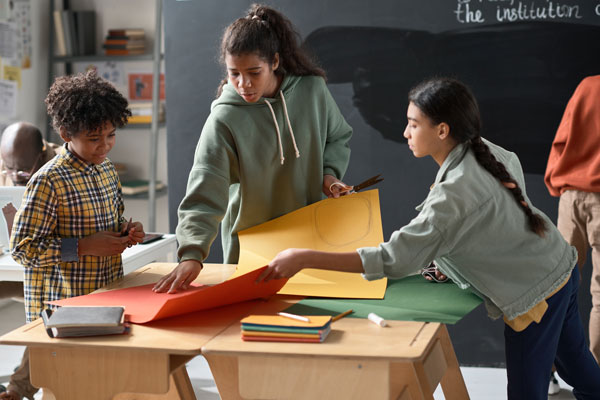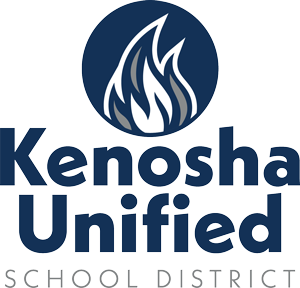Seventh Grade Academics

English Language Arts
The seventh grade English/Language Arts course provides students with a variety of learning opportunities designed to enhance reading, writing, grammar, and speaking/listening skills. Students will read many different kinds of texts, engage in insightful discussions and complete independent learning tasks to expand their skills. The major goal of this course is for students to construct meaning from complex texts. Active participation by students is essential to developing the skills necessary for meeting this goal. Writing instruction will focus on the writing process: planning, revising, editing and publishing specific types of writing including narrative, informative and argumentative. Throughout the year, students will work independently, in small groups, and in whole group settings. Collaboration with peers is a critical aspect of this course.
Standards
7th grade ELA Content Focus
- Taking Action: What helps people rise up and face difficulties?
- The Terror and Wonder of Space: Why is the idea of space exploration inspiring and unnerving?
- Change Agents: What inspires you to make a difference?
- Reality Check: What can blur the lines between what’s real and what’s not?
Novels:
- The Epic Fail of Arturo Zamora– Pablo Cartaya*
- Refugee– Alan Gratz *
- Before We Were Free– Julia Alvarez *
- The Rock and the River- Kekla Magoon
- A Good Kind of Trouble– Lisa Moore Ramée
- Watch Us Rise– Renee Watson and Ellen Hagan
- The Outsiders– SE Hinton*
- I am Alfonso Jones- Tony Medina
Math
In 7th grade math, students focus on four main areas: understanding and applying proportional relationships (like solving percent problems and working with scale drawings), working with rational numbers (positive and negative numbers) and solving equations, exploring geometry through area, surface area, and volume, and using data to make predictions about larger groups. Students also practice graphing proportional relationships, understanding slope, and using real-world examples to make sense of negative numbers and equations. They continue developing their geometry skills and learn how to use samples to make decisions about populations.
Standards
7th grade Math Content Focus
- Analyze proportional relationships and use them to solve problems.
- Add, subtract, multiply, and divide integers and rational numbers.
- Solve problems using numerical and algebraic expressions and equations.
- Solve problems involving angle measure, area, surface area, and volume.
- Draw inferences about populations based on samples.
Social Studies
Students will learn about the impact and importance to studying events of the past. Students will be taught about primary and secondary sources while being able to determine bias and point-of-view. Students will review geographic skills and be introduced to the possible effects geography had on people’s lives and interactions within the frame of history. Adaptations and manipulation of their geographic surroundings will teach students prehistory, focusing on inferences from artifacts and fossils. Students will progress focusing on early civilizations, Mesopotamia, Egypt and Kush. They will be able to learn the differences of these early civilizations and what adaptations made each civilization both successful and unsuccessful.
Standards
7th grade Social Studies Content Focus
- Why is history important? How do we learn about the past?
- How does geography influence the way people live? Why do people trade? Why do people form governments?
- How do people adapt to their environment?
- How does geography influence the way people live? Why does conflict develop?
- How does geography influence the way people live? What makes a culture unique? Why do civilizations rise and fall?
- How do new ideas change the way people live?
- What makes a culture unique?
- Why do civilizations rise and fall?
- What are the characteristics of a leader?
- How do religions develop?
Science
In 7th Grade Science students learn key concepts in science, such as chemical reactions, photosynthesis and ecosystems through investigating and making sense of real-world phenomena. Students practice thinking and working like real scientists and engineers by doing experiments, creating models, analyzing data, solving problems, and explaining what they discover. Throughout all of this, students also practice thinking skills like finding patterns, understanding cause and effect, and using math and models. They aren’t just memorizing facts — they’re learning how to think like scientists and engineers to explain the world around them.
Standards
7th grade Science Content Focus
- Chemical Reactions & Matter: Students investigate how substances react chemically and how the atoms in those substances are rearranged.
- Chemical Reactions & Energy: Students explore how chemical reactions can provide energy and design solutions for a flameless heater.
- Metabolic Reactions: Students investigate how cells in living things use chemical reactions to process food.
- Matter Cycling & Photosynthesis: Students examine how matter cycles through ecosystems and the role of photosynthesis.
- Ecosystem Dynamics: Students explore how changes to ecosystems affect what lives there and design solutions to address environmental problems.
- Earth’s Resources & Human Impact: Students investigate how human activities impact Earth’s resources and explore potential solutions.
Social Emotional Learning
Social-Emotional Learning (SEL) is the process through which students learn to:
- Understand and manage emotions
- Build positive relationships
- Make responsible decisions
- Set and work toward goals
- Show empathy and respect for others
These essential life skills help students succeed in school, at home, and in their communities.
Middle school is a time of rapid growth and change. Students are navigating new academic challenges, peer dynamics, and a growing sense of identity. SEL provides them with the tools they need to:
- Manage stress and emotions
- Strengthen social skills
- Develop confidence and self-awareness
- Resolve conflicts peacefully
- Stay focused and motivated
Research shows that students who receive consistent SEL instruction perform better academically, show improved behavior, and experience greater emotional well-being.
To support student development, KUSD uses Second Step Middle School—a research-based, developmentally appropriate SEL curriculum designed specifically for adolescents.
Second Step Middle School helps students build essential social-emotional skills through:
- Interactive lessons that focus on emotion regulation, goal-setting, decision-making, and relationships
- Engaging discussions and real-life scenarios that connect with students’ daily experiences
- Videos, peer conversations, and reflection activities that make SEL relatable and meaningful
The program is structured around key themes that support students in navigating the social and emotional challenges of middle school in healthy, productive ways.
Art
Art is an elective for all 7th graders and builds on a foundation of visual literacy in both 2D and 3D art mediums. Areas of knowledge and skill development include: Elements and principles of art, media exploration and technique development, art preservation and exhibition, art interaction and art as an aspect of daily life.
Standards
CTE
STEM 7 – Green Architecture (GA) & Energy and the Environment (EE), Project Lead the Way
- Course Content Focus
- Architectural Basics (GA)
- Introduction to Sustainable Architecture (GA)
- Architectural Challenge (GA)
- Investigating Energy (EE)
- Sustainable Energy (EE)
- Making an Impact (EE)
- Wisconsin Standards for Technology and Engineering
Computer Science 7
- Course Content Focus
- Artificial Intelligence in Our World
- Representation, Reasoning, and Machine Learning
- Generative and Applied AI
- Wisconsin Standards for Information and Technology Literacy
- Wisconsin Standards for Business and Information Technology
World Language
COMMUNICATION is at the heart of Kenosha Unified School District’s world language program, whether the communication takes place face-to-face, in writing, or across centuries through literature. Through the study of a world language, students will gain a knowledge and understanding of the CULTURES of the world; in fact, students cannot truly master a language until they have also mastered the cultural contexts in which the language occurs. Learning any world language provides students with CONNECTIONS to additional bodies of knowledge. Through COMPARISONS and contrasts with a world language, students will develop a greater insight into their own language and culture and realize that there are multiple ways of viewing the world. Together, these elements enable students to participate in multilingual COMMUNITIES at home and around the world.
Learning experiences in a world language classroom are designed to help students meet the National Standards for Foreign Language Learning of the 21st Century. These standards define in a larger context, what students should know and be able to do after a sequence of world language instruction.
- Standard 1: Communication – Communicate in a world language
- Standard 2: Cultures – Gain knowledge and understanding of the cultures of the world
- Standard 3: Connections – Use world language to connect with other disciplines and expand knowledge
- Standard 4: Comparisons – Develop insight through world language into the nature of language and culture
- Standard 5: Communities – Use world language to participate in communities at home and around the world
Rosetta Stone
For more information on each language provided through Rosetta Stone, please click on the link below:
Contact Information
Che Kearby
Coordinator of Secondary ELA & Social Studies
ckearby@kusd.edu
262-359-7391
Christine O’Regan
Coordinator of Library Media & Instructional Technology
coregan@kusd.edu
262-359-7444
Sarah Shanebrook Smith
Coordinator of Language Acquisition
sshanebr@kusd.edu
262-359-5909
Jennifer Lawler
Coordinator of Secondary Math & Science
jlawler@kusd.edu
262-359-7003
Bryan Mogensen
Coordinator of Athletics/Physical Education
bmogense@kusd.edu
262-359-6384
Aaron Williams
Coordinator of Career & Technical Education
awilliam@kusd.edu
262-359-6313
Scott Plank
Coordinator of Fine Arts
splank@kusd.edu
262-359-6389
Laura Stone
Coordinator of Student Support
lstone@kusd.edu
262-359-2492
